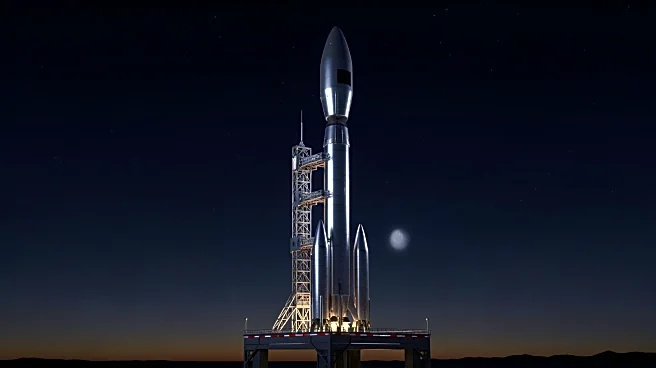What's Happening?
Blue Origin is set to launch its second New Glenn rocket on November 9, aiming to repeat the success of its debut launch in January. The company plans to attempt recovery of the reusable first stage, which
was unsuccessful during the first launch. The NG-2 mission will carry two NASA science satellites, known as Escapade, bound for Mars. These satellites will be deployed into a phasing orbit around Lagrange Point 2 until the next planetary window opens. The mission also includes a ViaSat technology demonstration for NASA's Communications Services Project, aiming to provide commercial space relay communications services.
Why It's Important?
The upcoming launch of Blue Origin's New Glenn rocket is significant as it represents a key milestone in the company's efforts to establish itself as a major player in the space industry. The successful deployment of NASA's Escapade satellites could enhance scientific understanding of Mars' atmosphere and magnetic fields, contributing to future exploration missions. The inclusion of a ViaSat technology demonstration highlights the growing importance of commercial partnerships in space communications, potentially influencing the development of new services and technologies. Stakeholders, including NASA and commercial partners, may benefit from the advancements and insights gained from this mission.
What's Next?
Following the NG-2 launch, Blue Origin may continue to refine its rocket recovery techniques and expand its capabilities in space exploration. The company could pursue additional partnerships and missions to enhance its market position and technological offerings. Stakeholders, including government agencies and commercial partners, will likely monitor the progress of Blue Origin's initiatives, assessing their impact on the space industry and future exploration efforts.
Beyond the Headlines
The launch of New Glenn highlights the growing role of private companies in space exploration, raising ethical and legal considerations regarding competition and collaboration in the industry. The focus on reusable rocket technology reflects broader trends of innovation and sustainability in space missions, potentially influencing future strategies and policies. Additionally, the integration of commercial space relay communications services underscores the importance of partnerships between government and industry in advancing space capabilities.








